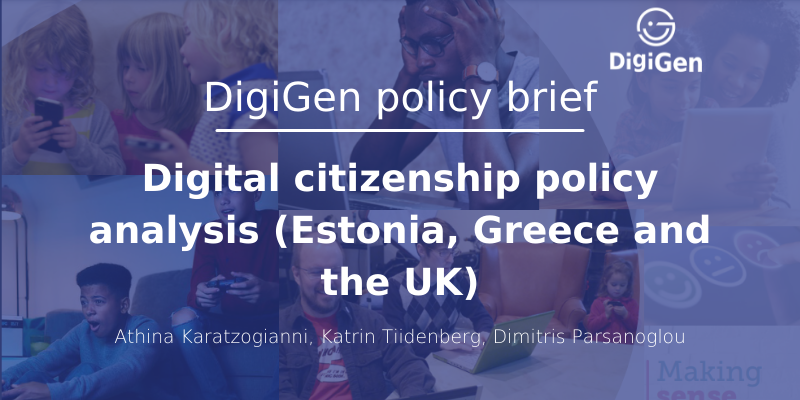Our second DigiGen policy brief critically assesses over forty policy documents relating to digital citizenship from Estonia, Greece, and the United Kingdom. This analysis explores how digital citizenship is being constructed by different policy actors across Europe. In general, there is a tendency to reduce digital citizenship to initiatives supporting the digitalisation of public services e.g. using a digital ID, or accessing medical results online. As a result, this policy brief argues that we should broaden the policy discourse to show that digital services, the internet, ICT tools and social media are more than completing daily tasks. Cumulatively, they can be tools for supporting citizens’ civic engagement, political participation, and expression of personal political agency.
Recommendations stemming from this exercise are then contextualised through EU policy frameworks, the UN Sustainable Development Goals, and the other DigiGen research domains: education, family life, and leisure.
Our policy analysis presents a wide range of recommendations but here are two main insights to set the scene:
ACCESS to digital tools as a prerequisite for digital citizenship
- Reduce digital deprivation through increasing access to digital tools as essential services as acknowledged in the European Pillar of Social Rights and the EU Child Guarantee. Children cannot engage in digital citizenship if they do not have access to digital tools. Children across Europe are experiencing digital deprivation with widespread disparity across Member States, for example 23.1% of children in Romania and 1% in Germany.
COMPETENCY as an essential enabling factor for digital citizenship
- Ensure that children receive education on digital citizenship. Education to date has focused on digital literacy, notably being critical of sources and being wary of strangers. This does not support young people in realising how digital technologies can be useful for civic participation whilst informing them on what the risks are.
Read the full policy brief here for more insights and recommendations

